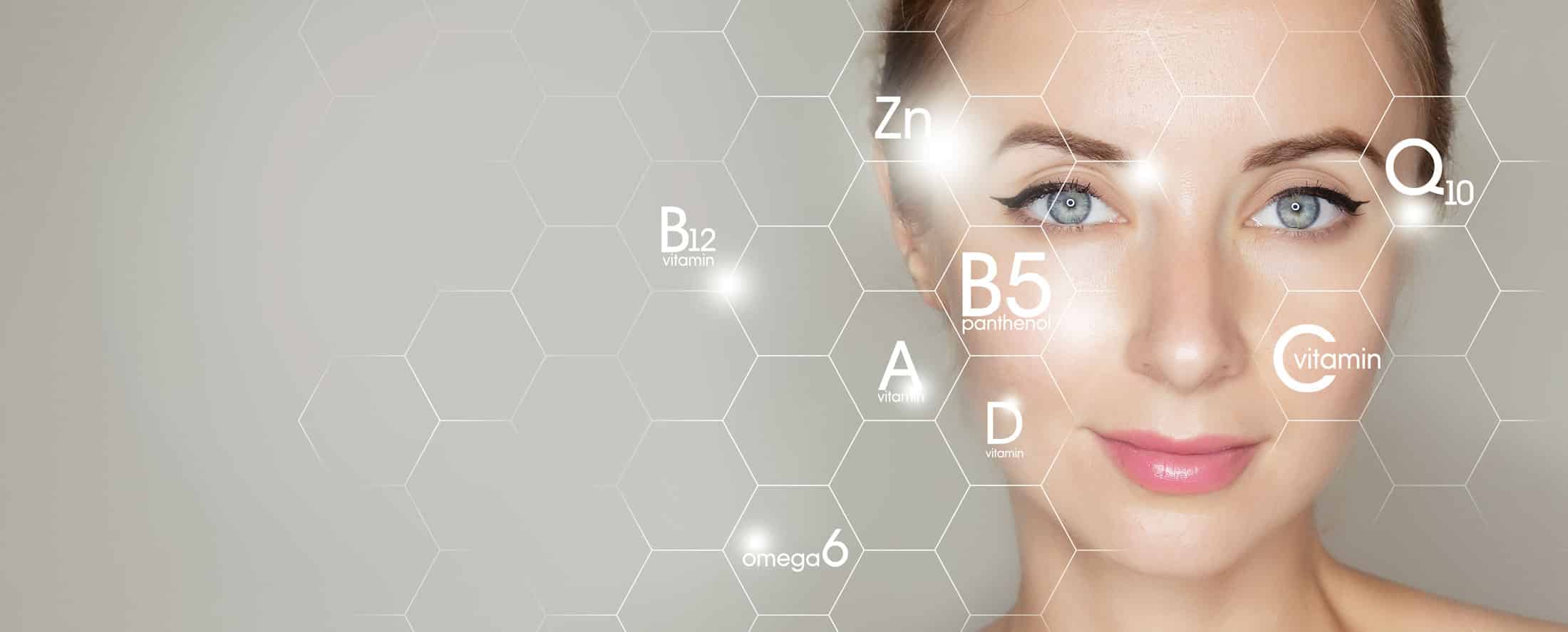Collagen is a big buzz now in the world of beauty and skin care. See what the science says about the benefits of using collagen daily:
Reduces Wrinkles and Slows Aging
Aging causes collagen in our skin to weaken leading to visible signs of aging including wrinkles and saggy skin. Preclinical studies show that regular intake repairs skin collagen and elastin protein fibers and strengthens the outer skin surface. Other studies have reported that supplementation decreased wrinkles and improved skin hydration and firmness.
Antioxidant
Protection
Collagen contains several amino acids including lysine, glycine, proline, and hydroxyproline. Proline and glycine play important antioxidant roles by protecting against free radicals that cause cell damage. Hydroxyproline is made into glycine and it may help regulate a cell’s oxidative state. Preclinical studies show that it also protects against oxidative skin damage caused by ultraviolet light from sun exposure.
Bone
Growth
Collagen supplementation increases natural collagen synthesis and helps incorporate minerals into the bone matrix. Daily supplementation also significantly increases the size and mineral density of femur bones.
Bone
Strength
Bone strength is a function of the quantity and quality of bone tissue including its collagen microstructure. Supplementation improves collagen quality while supplementation in animals significantly increases bone mineral density and toughness.
Protein Intake and Body Composition
Dietary protein is not only essential for
weight management but is also required to maintain lean body mass and muscle
repair. It is also essential to maximize athletic performance by helping to
build muscle and improve workout performance and recovery. Collagen is a
pure protein with no fat or carbohydrate to dilute its impact.
If you feel that you may benefit from taking collagen, talk to your therapist and ask about what type is best for you. You can also check out our online store!
References:
- Sibilla S, Godfrey M, Brewer S, Budh-Raja A, Genovese L. An Overview of the Beneficial Effects of Hydrolysed Collagen as a Nutraceutical on Skin Properties: Scientific Background and Clinical Studies. The Open Nutraceuticals Journal, 2015;8:29-42. Accessed online on December 7, 2018 at https://www.researchgate.net/publication/276696375_An_Overview_of_the_Beneficial_Effects_of_Hydrolysed_Collagen_as_a_Nutraceutical_on_Skin_Properties_Scientific_Background_and_Clinical_Studies
- Alemán A, Giménez B, Montero P, Gómez-Guillén MC. Antioxidant activity of several marine skin gelatins. LWT-Food Science and Technology 2011;44(2): 407-413. Accessed online on December 7, 2018 at https://www.sciencedirect.com/science/article/pii/S0023643810003051
- Wu G, Wu Z, Dai Z, Yang Y, Wang W, Liu C, Wang B, Wang J, Yin Y. Dietary requirements of “nutritionally non-essential amino acids” by animals and humans. Amino Acids. 2013 Apr;44(4):1107-13. Accessed online on December 7, 2018 at https://www.ncbi.nlm.nih.gov/pmc/articles/PMC4935284/
- Wu G, Bazer FW, Burghardt RC, Johnson GA, Kim SW, Knabe DA, Li P, Li X, McKnight JR, Satterfield MC, Spencer TE. Proline and hydroxyproline metabolism: implications for animal and human nutrition. Amino Acids. 2011 Apr;40(4):1053-63. Accessed online on December 7, 2018 at https://www.ncbi.nlm.nih.gov/pmc/articles/PMC3773366/
- Hou H, Li B, Zhang Z, Xue C, Yu G, Wang J, Bao Y, Bu L, Sun J, Peng Z, Su S. Moisture absorption and retention properties, and activity in alleviating skin photodamage of collagen polypeptide from marine fish skin. Food Chem. 2012;Dec 1;135(3):1432-9. Accessed online on December 7, 2018 at https://www.sciencedirect.com/science/article/pii/S0308814612009818
- Genovese L, Corbo A, Sibilla S. An Insight into the Changes in Skin Texture and Properties following Dietary Intervention with a Nutricosmeceutical Containing a Blend of Collagen Bioactive Peptides and Antioxidants. Skin Pharmacol Physiol. 2017;30(3):146-158. doi: 10.1159/000464470. Accessed online on December 7, 2018 at https://www.medscape.com/medline/abstract/28528342
- De Luca C, Mikhal’chik EV, Suprun MV, Papacharalambous M, Truhanov AI, Korkina LG. Skin Anti-ageing and Systemic Redox Effects of Supplementation with Marine Collagen Peptides and Plant-Derived Antioxidants: A Single-Blind Case-Control Clinical Study. Oxid Med Cell Longev. 2016;2016:4389410. doi: 10.1155/2016/4389410. Accessed online on December 7, 2018 at https://www.ncbi.nlm.nih.gov/pmc/articles/PMC4745978/
- Proksch E, Schunck M, Zague V, Segger D, Degwert J, Oesser S. Oral intake of specific bioactive collagen peptides reduces skin wrinkles and increases dermal matrix synthesis. Skin Pharmacol Physiol. 2014;27(3):113-9. Accessed online on December 7, 2018 at https://www.karger.com/Article/Abstract/355523
- Yamada S, Nagaoka H, Terajima M, Tsuda N, Hayashi Y, Yamauchi M. Effects of fish collagen peptides on collagen post-translational modifications and mineralization in an osteoblastic cell culture system. Dent Mater J. 2013;32(1):88-95. Accessed online on December 7, 2018 at https://www.ncbi.nlm.nih.gov/pmc/articles/PMC3780798/
- Xu, YaJun, XiaoLong Han, and Yong Li. Effect of marine collagen peptides on long bone development in growing rats. Journal of the Science of Food and Agriculture 2010;90.9:1485-1491. Accessed online on December 7, 2018 at https://www.medscape.com/medline/abstract/20549801
- Elango J, Sanchez C, de Val JEMS, Henrotin Y, Wang S, Motaung KSCM, Guo R, Wang C, Robinson J, Regenstein JM, Bao B, Wu W. Cross-talk between primary osteocytes and bone marrow macrophages for osteoclastogenesis upon collagen treatment. Sci Rep. 2018 Mar 28;8(1):5318. doi: 10.1038/s41598-018-23532-x. Accessed online on December 7, 2018 at https://www.researchgate.net/publication/324083955_Cross-talk_between_primary_osteocytes_and_bone_marrow_macrophages_for_osteoclastogenesis_upon_collagen_treatment
- Phillips SM, van Loon LJC. Dietary protein for athletes: From requirements to optimum adaptation. Journal of Sports Science. 2011:19 (Suppl 1):S29-38. Accessed online on December 7, 2018 at https://www.ncbi.nlm.nih.gov/pubmed/22150425
- US DRIs. United States Department of Agriculture. Dietary reference intakes (DRIs): Estimated average requirements. Accessed online in April 7, 2018 at https://www.nal.usda.gov/fnic/dri-tables-and-application-reports


